Meet V Jayaprakash, an innovator and entrepreneur from Kerala who has sold over 8k eco-friendly stoves
This chulla maker from Kerala has improvised the portable stove using techniques of complete combustion and gasification.

Forty-seven-year-old V Jayaprakash recalls how he went door to door, selling clay stoves in the villages near Koyilandy, Kerala.
As a young child, I had to help my mother who bought these stoves from Coimbatore and sell it to people to help support the education of her six children, he says.
Seeing how these biomass stoves emitted huge amounts of smoke, Jayaprakash’s inquiring mind thought of various ideas that could mitigate this problem and help women who choked in the kitchen while cooking.
The enterprising youngster then tried fitting a small pipe (that acted like a chimney) at the backside of these stoves. “Since I was scared that the idea might fail, I tried it in the neighbouring village first,” quips Jayaprakash, recounting how the instant success of his initial idea worked wonders for many rural households.
An inquisitive mind since childhood
Apart from his chimney innovation that was a hit among people, Jayaprakash’s early inventions included a pulley to lift load and a small toy motor boat that could go up to a certain distance and come back automatically.
Though a regular participant at various science exhibitions at school, Jayaprakash had to opt out of studies after secondary level due to financial constraints. But even then he continued to harbour dreams. Despite being a daily wage worker, he was keen on improvising and creating a smokeless stove in future.
Initial hurdles
Though Jayaprakash kept experimenting, it was a ten-day long training programme on working with solar energy organised by Agency for Non-Conventional Energy and Rural Technology (ANERT), Kerala that helped channelise his innovative ideas.
A local newspaper mention about hospital waste being dumped in an agricultural field irked him and led him to connect with the hospital manager, who then offered an initial sum of Rs 20,000 to create a stove where all the hospital waste could be burnt.
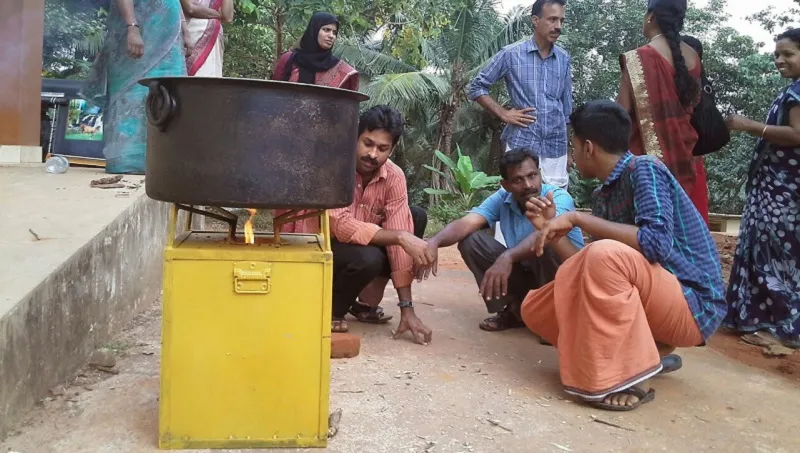
Though he was successful in customising a community stove, Jayaprakash and his helper were surprised to see a sudden spur of high-raising flames near the chimney of the stove that was burning the hospital waste. On further questioning, he found out from RNG Menon, the then Director of ANERT, more details on how processes like gasification and complete combustion work.
Creation of his own energy-efficient stove
So, what’s unique about Jayaprakash’s eco-friendly version of the portable stove?
It’s the two-tier system of burning that ensures both the biomass fuel and the smoke created from it are completely burnt creating less pollution, he shares.
Further explaining the working of his unique stove made of stainless less and cast iron, he adds: “After close to four years of conducting various experiments, I zeroed in on a model where I punched holes into a ceramic pipe that can provide oxygen for the complete combustion of carbon particles at a secondary level, emitting less smoke and, hence, working more efficiently.”
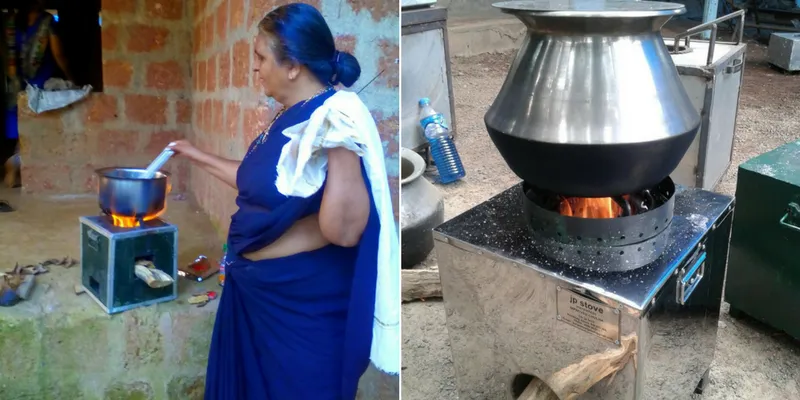
Jayaprakash’s energy-efficient stove, which he claims is both women- and-child friendly, “gives out an almost near blue flame with tinges of golden yellow”. This socially helpful innovation has won Jayaprakash the energy conservation award from Energy Management Centre, Kerala in 1998, and the National Innovation Award in 2012 (organised by National Innovation Foundation) from the then President of India, Prathiba Patel.
Journey of becoming an entrepreneur
A test report by Integrated Rural Technology Centre, Mundur, Kerala suggested that the combustion efficiency of Jayaprakash’s energy-efficient stove is 36.67 percent (when wood is used as fuel) and 29.48 percent (when coconut shell is used).
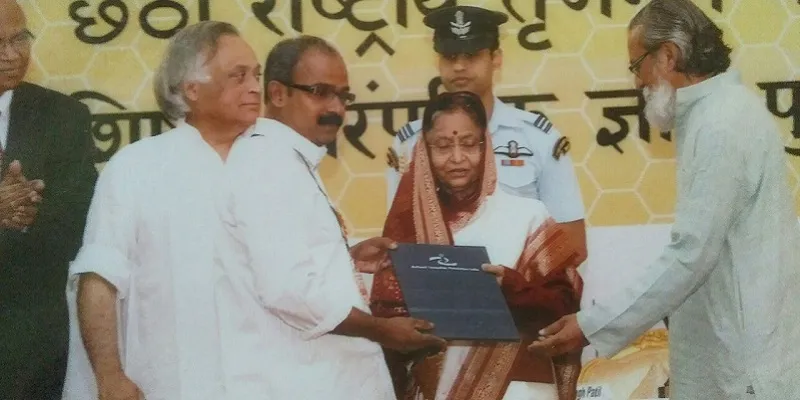
The Kerala-based innovator has also used the same complete combustion technology to create huge community stoves of various capacities ranging from 1-100 kg. A team of experts from ANERT testing the efficiency of these community stoves found out that a hotel in Kohzikode needs only 75 coconut shells costing about Rs 75 for cooking 40kg rice, which is in stark contrast to 10kg of LPG costing Rs 4,000 to cook the same quantity.
Jayaprakash, apart from having patents for the technologies behind both kinds of stoves, also owns and runs JP Tech, a clean energy startup that takes orders and mass produces these eco-friendly stoves. So far, Jayaprakash has installed over 7,500 energy-efficient stoves in several households all across Kerala.
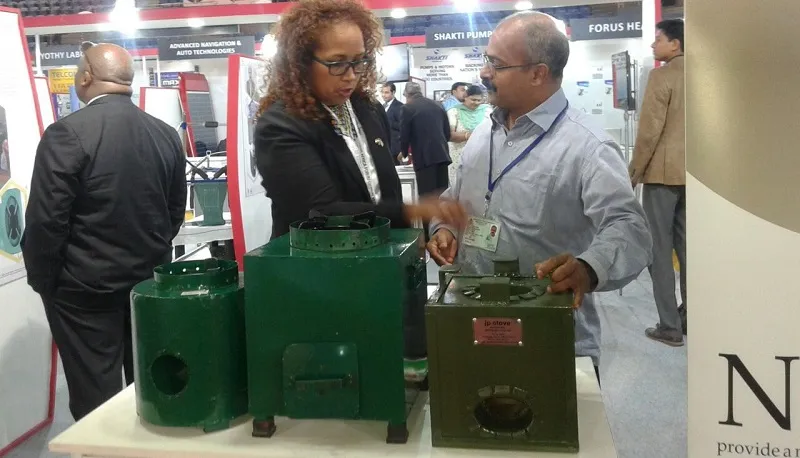
The promising entrepreneur is also credited to have installed over 200 community stoves for preparing mid-day meals across various schools in the State in partnership with United Nations Development Fund (UNDP). With over 1,000 of these sold already, Jayaprakash is always flooded with orders that come from various schools, community kitchens, marriage halls etc., from Tamil Nadu, Kerala and Karnataka.
More inventions coming
Having given employment to 6-7 families working in his small factory in Coimbatore, Jayaprakash is happy about supporting the livelihoods of many people.
I derive a lot of satisfaction and happiness through my entrepreneurial work, he says.
Jayaprakash’s efficient and portable stoves are also easy on the pocket. While the 1kg stove costs Rs 4,000, the 10kg one is priced at Rs 15,000 (the largest 100kg stove costs about Rs 65,000). Speaking of future improvisations to this stove, he adds, “I’m confident that I will succeed in achieving a complete blue flame.”
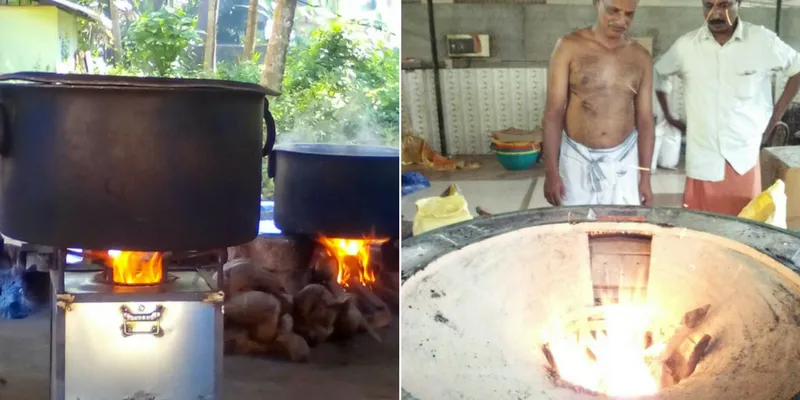
Apart from his acclaimed stove innovation, Jayaprakash has also invented a machine that is capable of efficiently burning sanitary napkin waste. “I have also designed a mobile crematorium that can run on burning biomass fuel without emitting much smoke or foul smell,” he says, with a zest to keep on innovating.
Ask him what’s the driving force behind such novel inventions, and he concludes, saying, Being keen on the various problems and needs of people and helping to solve them through your creative skills.







